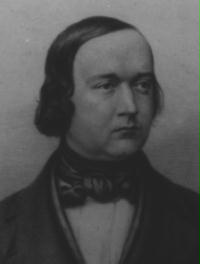Alexander Fesca
Alexander Ernst Fesca (born May 22, 1820 in Karlsruhe , † February 22, 1849 in Braunschweig ) was a German composer and pianist .
Life
Alexander Ernst Fesca was born on May 22, 1820 as the second eldest of four sons of the composer Friedrich Ernst Fesca (1789–1826) and his wife Charlotte (née Dingelstedt; daughter of horn player Johann Heinrich Dingelstedt ) in Karlsruhe.
Fesca received his first lessons from his father and made his debut as a pianist in his hometown at the age of 11. At the age of 14 he began studying composition at the Royal Academy of Arts in Berlin . His teachers included August Wilhelm Bach (1796-1869), Wilhelm Taubert (1811-1891) and Carl Friedrich Rungenhagen (1778-1851).
In 1838 he returned to Karlsruhe. In the same year the composer received his first recognition with the performance of his operetta Mariette . In the course of his short life, however, Alexander Ernst Fesca became known more for his songs, salon and piano pieces, in which his great talent is paired with a certain musical ease. This lightness was probably the reason that some musicologists said that his works had "lower content" and "artistic seriousness".
In 1841 his opera The French in Spain was performed with great success in Karlsruhe . Prince Egon von Fürstenberg appointed Fesca a chamber virtuoso in the same year. From 1842 he settled in Braunschweig. Fesca's main work, his five-act heroic-romantic opera The Troubadour based on a libretto by Friedrich Schmetzers, premiered in the local court theater on Hagenmarkt on July 25, 1847 .
Alexander Ernst Fesca died on February 22, 1849 in Braunschweig at the age of 28 of a lung disease.
Works (selection)
adagio
- Espérance (op.24)
Fantasies
- Fantasy based on motifs from the opera Don Giovanni by Wolfgang Amadeus Mozart (op.43)
- Fantasy based on motifs from the opera Der Freischütz by Carl Maria von Weber (op.50)
- Le dernier soupir (op.58)
Piano sextet
- Piano sextet in B flat major (op.8)
Piano trios
- Piano Trio No. 1 (op.11)
- Piano Trio No. 2 (op.12)
- Piano trio No. 3 (op.23)
- Piano trio No. 4 (op.31)
- Piano trio No. 5 (op.46)
- Piano trio No. 6 (op.54)
Piano quartets
- Piano quartet No. 1 (op.26)
- Piano quartet No. 2 (op.28)
Operas
- The French in Spain (Premiere Karlsruhe 1841)
- The Troubadour (Premiere Braunschweig 1847)
- Ulrich von Hutten (unfinished)
operetta
- Mariette (Premiere Karlsruhe 1838)
rondo
- Introduction et grand rondeau (op.3)
Septets
- Great Septet No. 1 (op.26)
- Great Septet No. 2 (op.28)
String quartet
- String Quartet in C minor
Songs
- Five songs by Heinrich Schütz for a tenor voice with accompaniment of the pianoforte (op. 13), Braunschweig, GM Meyer jr. 1842
Discography
His music is only recorded on one CD (as of 2010): the Linos Ensemble recorded its two septets in 1999 for the classic label cpo .
literature
- Moritz Fürstenau : Fesca, Alexander Ernst . In: Allgemeine Deutsche Biographie (ADB). Volume 6, Duncker & Humblot, Leipzig 1877, p. 722.
- Ralf Eisinger: Fesca, Alexander Ernst. In: Luitgard Camerer , Manfred Garzmann , Wolf-Dieter Schuegraf (eds.): Braunschweiger Stadtlexikon . Joh. Heinr. Meyer Verlag, Braunschweig 1992, ISBN 3-926701-14-5 , p. 70-71 .
- Steffen Tiggeler: Fesca, Alexander Ernst. In: Horst-Rüdiger Jarck , Günter Scheel (ed.): Braunschweigisches Biographisches Lexikon - 19th and 20th centuries . Hahnsche Buchhandlung, Hannover 1996, ISBN 3-7752-5838-8 , p. 176 .
Web links
- Works by and about Alexander Fesca in the catalog of the German National Library
- Works by and about Alexander Fesca in the German Digital Library
- Catalog of works at klassika.info
grades
- Sheet music and audio files by Alexander Fesca in the International Music Score Library Project
- Sheet music in the public domain by Alexander Fesca in the Choral Public Domain Library - ChoralWiki (English)
Individual evidence
| personal data | |
|---|---|
| SURNAME | Fesca, Alexander |
| ALTERNATIVE NAMES | Fesca, Alexander Ernst (full name) |
| BRIEF DESCRIPTION | German composer and pianist |
| DATE OF BIRTH | May 22, 1820 |
| PLACE OF BIRTH | Karlsruhe |
| DATE OF DEATH | February 22, 1849 |
| Place of death | Braunschweig |
